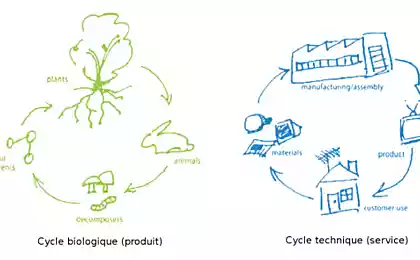791
On the prospects of chemistry in Russia
Share your experiences, maybe it would be someone useful. If you want after graduation to study science, it is not necessary to spend time on the magistracy, and even more so in the post-graduate course in Russian! In Russia, there is no science, she quietly died. The same applies to applied research, development for the industry and so on. If your child is interested in chemistry, physics, biology, showing the ability of these subjects, tune to the fact that he will sooner or later have to go abroad if he wants to be held in this life as a researcher. If you are studying for the bachelor or specialist in the field of natural sciences, do not go to the Master of Science in Russia, and even more so do not plan on enrolling in graduate school. It's a waste of time. I am convinced of this the hard way, and no one would not wish.
Working conditions in Russian institutions simply do not have. Reagents are not enough, the old equipment, laboratories inundated with junk still Soviet times from floor to ceiling. Here, for example, a few photos of our chemical laboratory at the Institute of Inorganic Chemistry SB RAS (Novosibirsk):
6 photo + letter via vscht
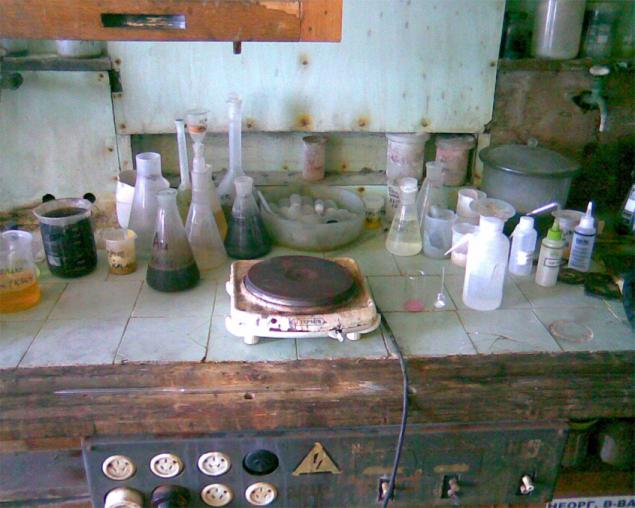
Attention - on tripods rusty, stiff with age rubber hose, jagged tiles under the hood. More from the thrust constantly spilling trash because the ventilation system is not cleaned probably since the middle of last century, it rose garlands dust particles accumulated rust. All this stuff when the drawing joyfully showered directly at your workplace.
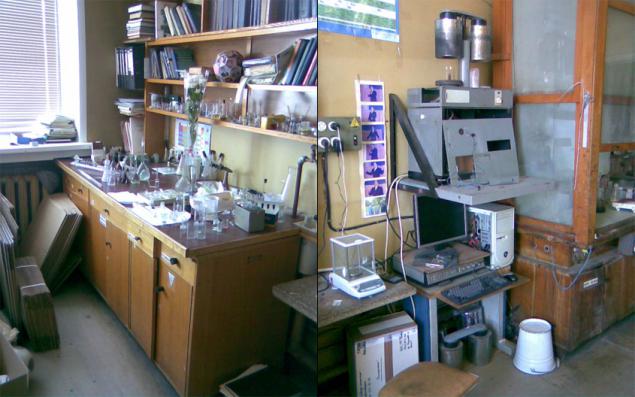
Sorely lacking elementary consumables needed chemist - rubber gloves, napkins, filter paper, means for washing glassware, even brushes - and the no! Well, tell me, in such circumstances, you can get some valuable scientific results? If for every little thing you need to run a financially responsible person lab checkout process, then wait for it two weeks? The supply chain is not just inefficient, it does not work!
For safety all wanted to spit - no points for the acid, rubber gloves - one for the rest of the lab, which employs 4-5 people. And here's a picture of the room where there are X-ray diffractometer:
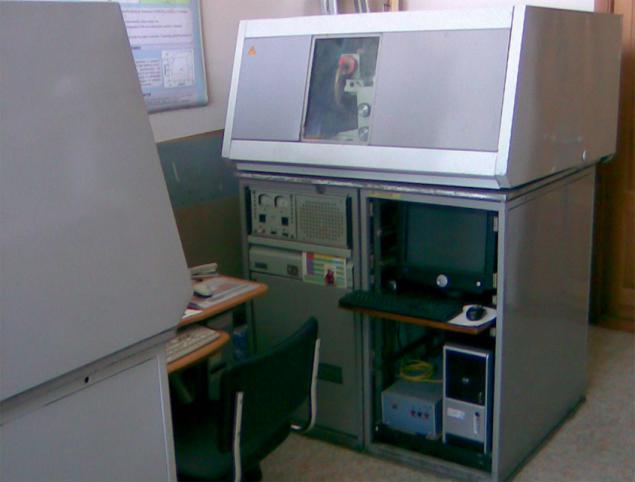
As you can see, between the two diffractometers (both - the production of the GDR, 1975), is the operator's station, where he spends most of his working time. Between the two crossed beams sitting, to put it simply. About piercing appliances generally keep quiet. How many times do I have shied away from the current spiral stove for quartz reactor! Helix is not isolated, but when you install the reactor is a risk to touch her. Primotat any insulation is not possible, because it melted in the course of the stove - this design. Not for people but for cyborgs probably make that 220 overweening.
For comparison, the Graduate School of Chemical Technology in Prague ordinary laboratory for doctoral looks like this (Photo by Ilya Rudomilova):
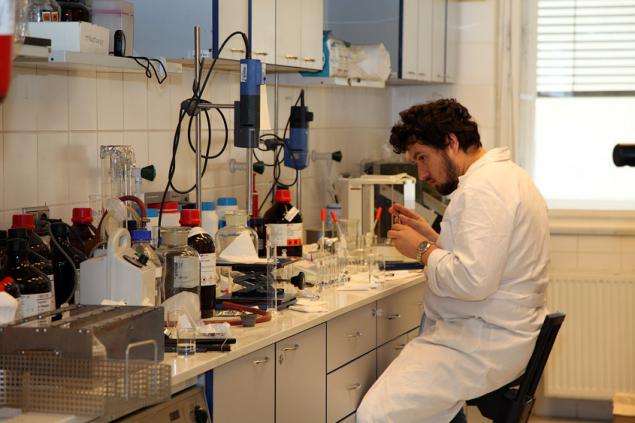
I had a chance at the undergraduate intern to work in multinational Schlumberger. It - service company, provides technologies and materials for oil and gas, for example, Gazprom and Rosneft. Simply put, they are paid the money, and they come to the area, well drilled, launch it and leave. The client then pumps oil itself. It's not that simple, of course, but in general the circuit was. So, I worked as an intern in the research center of Schlumberger, which is developing new technologies of oil production. It turns out there's a lot of chemistry, not just engineering. We have to develop all sorts of gels, fibers, select additives to improve viscosity, yield stress fracturing fluids, etc. A lot of work in the chemical laboratory, a rather monotonous and heavy. Here on this work and taking interns - students of senior courses chemists rarely graduate. Teach them all show, and then they work themselves, from start to finish. Personally, I worked the whole summer I was at full-time. So tired of that came home and fell after a day of jumping around devices like nothing. Leaves early, come late, experiments are often delayed, but they had to finish because I asked a very strictly. But there was a laboratory - sight for sore eyes! As they say, feel the difference:
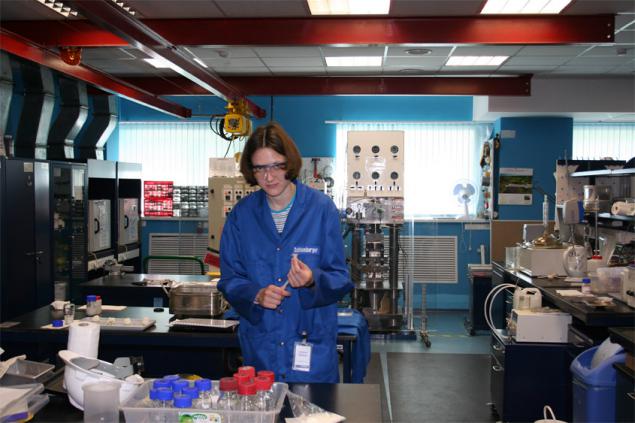
Everything is new, everything works raskhodki - in bulk, gloves - disposable (!) Of different sizes, containers weighing - also disposable, so no contamination in the material is not horrible. Paper napkins - a whole bunch, worked - rubbed over a work surface and thrown, no wash cloths not necessary. Volumes selected syringes without needles, syringes, then these ejected and not washed. It all just seems a trifle, but in fact it is not a trifle. For the chemist there is nothing more important than the convenience of working in a laboratory.
Safety, of course, there are up to par. Bathrobe - from normal, heavy cotton cloth, not the ones that are burnt in a second acid. Yet there is bound during the entire stay in the lab have to wear glasses. No matter what you do, even if something benign, such as cutting a Fiber.
All devices - perfectly grounded. If suddenly someone electric shock, it would be a huge event, Emergency Event, the person would be sent to the doctor, and then gathered to the meeting, which discussed why it happened and how to continue to avoid it. Sometimes they are even with all that overdoing, like mandatory safety training, which is often carried out, and something new to them rarely discussed. In short, the normal attitude to employees, not disregard. I liked working in Schlumberger, despite the fact that working there was extremely difficult. The downside of this organization, too, enough of course, but they are likely to relate to those who work there on a permanent basis. By the way, what is surprising - Schlumberger in employment also looks at the paper, and soon will a person with a degree than those without degrees. Is this calculation have at least once justified? How, I wonder, PhDs are better prepared to work in Schlumberger than graduates? What they learn in addition to their graduate schools, which acquire useful skills? They can work in the mud and ruin, gritting his teeth? I am here in our lab at the institute even frightened to go after work in Shlyume.
No material-technical base - there is no any significant results. What are our publications in comparison with French, American, Chinese, Czech, finally? The system works in science is rotten through and through, utyanuv the post-university education. Fellowship in Russia - a waste of time. If you could play it all back, I would have immediately after graduation went to enter the doctoral program abroad. As did many of my classmates, by the way. Everyone is now doing differently, some happy, some not so, but nobody is going to come back. In the Czech Republic, however, no one left, more to France, Holland. One girl is now in the United States, two - in New Zealand. In English-speaking countries is easier, fewer problems with language, but somewhere in France a bunch of problems. Learn something my classmates in English, and the people around talking in French. In general, in my opinion, to go to another country to learn a language that is not native to its inhabitants - is absurd. So you'll never be his. Stay perpetual foreigner. It is not realistic at the same time learning English, and teach the mother tongue of the population. Time is not enough. And it is unlikely you with your English will be very happy in this country, even after the end of the local university. This, incidentally, was one of the reasons why I did not leave right after graduation. Russian decided to remain among the Russian. Little did I know that in the Czech Republic, there are annual intensive courses for admission to universities in the Czech language. I learn about courses UJOP Charles University only this summer, during a tourist trip to Prague. These courses have become a godsend for me. Next year I will go to its center for chemists, biologists and physicians in Marianske Lazne to learn the language, then to go to graduate school. Nose will dig the earth, but back to the Russian graduate will not go back. And I do not care for all the ridicule, sidelong glances, xenophobia and his ilk. If you are a normal person, sooner or later, people will understand it and will not look at you askance. Will communicate on an equal footing, if they see that you are not afraid of them, are friendly and open, not holding a fig in the pocket. People - it's all the same people, not any crocodiles. And if a coward, that you and House zastebayut.
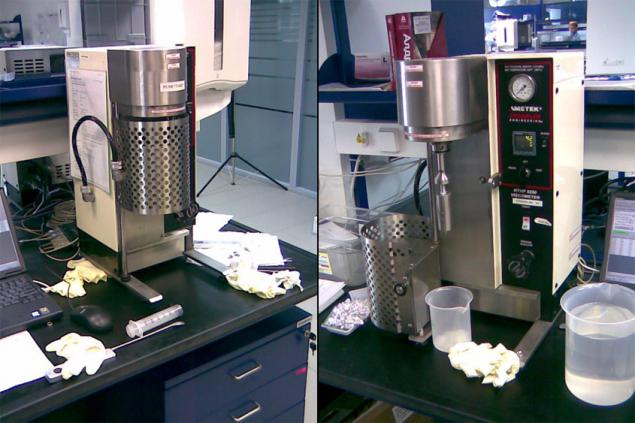
Source:
Working conditions in Russian institutions simply do not have. Reagents are not enough, the old equipment, laboratories inundated with junk still Soviet times from floor to ceiling. Here, for example, a few photos of our chemical laboratory at the Institute of Inorganic Chemistry SB RAS (Novosibirsk):
6 photo + letter via vscht

Attention - on tripods rusty, stiff with age rubber hose, jagged tiles under the hood. More from the thrust constantly spilling trash because the ventilation system is not cleaned probably since the middle of last century, it rose garlands dust particles accumulated rust. All this stuff when the drawing joyfully showered directly at your workplace.

Sorely lacking elementary consumables needed chemist - rubber gloves, napkins, filter paper, means for washing glassware, even brushes - and the no! Well, tell me, in such circumstances, you can get some valuable scientific results? If for every little thing you need to run a financially responsible person lab checkout process, then wait for it two weeks? The supply chain is not just inefficient, it does not work!
For safety all wanted to spit - no points for the acid, rubber gloves - one for the rest of the lab, which employs 4-5 people. And here's a picture of the room where there are X-ray diffractometer:

As you can see, between the two diffractometers (both - the production of the GDR, 1975), is the operator's station, where he spends most of his working time. Between the two crossed beams sitting, to put it simply. About piercing appliances generally keep quiet. How many times do I have shied away from the current spiral stove for quartz reactor! Helix is not isolated, but when you install the reactor is a risk to touch her. Primotat any insulation is not possible, because it melted in the course of the stove - this design. Not for people but for cyborgs probably make that 220 overweening.
For comparison, the Graduate School of Chemical Technology in Prague ordinary laboratory for doctoral looks like this (Photo by Ilya Rudomilova):

I had a chance at the undergraduate intern to work in multinational Schlumberger. It - service company, provides technologies and materials for oil and gas, for example, Gazprom and Rosneft. Simply put, they are paid the money, and they come to the area, well drilled, launch it and leave. The client then pumps oil itself. It's not that simple, of course, but in general the circuit was. So, I worked as an intern in the research center of Schlumberger, which is developing new technologies of oil production. It turns out there's a lot of chemistry, not just engineering. We have to develop all sorts of gels, fibers, select additives to improve viscosity, yield stress fracturing fluids, etc. A lot of work in the chemical laboratory, a rather monotonous and heavy. Here on this work and taking interns - students of senior courses chemists rarely graduate. Teach them all show, and then they work themselves, from start to finish. Personally, I worked the whole summer I was at full-time. So tired of that came home and fell after a day of jumping around devices like nothing. Leaves early, come late, experiments are often delayed, but they had to finish because I asked a very strictly. But there was a laboratory - sight for sore eyes! As they say, feel the difference:

Everything is new, everything works raskhodki - in bulk, gloves - disposable (!) Of different sizes, containers weighing - also disposable, so no contamination in the material is not horrible. Paper napkins - a whole bunch, worked - rubbed over a work surface and thrown, no wash cloths not necessary. Volumes selected syringes without needles, syringes, then these ejected and not washed. It all just seems a trifle, but in fact it is not a trifle. For the chemist there is nothing more important than the convenience of working in a laboratory.
Safety, of course, there are up to par. Bathrobe - from normal, heavy cotton cloth, not the ones that are burnt in a second acid. Yet there is bound during the entire stay in the lab have to wear glasses. No matter what you do, even if something benign, such as cutting a Fiber.
All devices - perfectly grounded. If suddenly someone electric shock, it would be a huge event, Emergency Event, the person would be sent to the doctor, and then gathered to the meeting, which discussed why it happened and how to continue to avoid it. Sometimes they are even with all that overdoing, like mandatory safety training, which is often carried out, and something new to them rarely discussed. In short, the normal attitude to employees, not disregard. I liked working in Schlumberger, despite the fact that working there was extremely difficult. The downside of this organization, too, enough of course, but they are likely to relate to those who work there on a permanent basis. By the way, what is surprising - Schlumberger in employment also looks at the paper, and soon will a person with a degree than those without degrees. Is this calculation have at least once justified? How, I wonder, PhDs are better prepared to work in Schlumberger than graduates? What they learn in addition to their graduate schools, which acquire useful skills? They can work in the mud and ruin, gritting his teeth? I am here in our lab at the institute even frightened to go after work in Shlyume.
No material-technical base - there is no any significant results. What are our publications in comparison with French, American, Chinese, Czech, finally? The system works in science is rotten through and through, utyanuv the post-university education. Fellowship in Russia - a waste of time. If you could play it all back, I would have immediately after graduation went to enter the doctoral program abroad. As did many of my classmates, by the way. Everyone is now doing differently, some happy, some not so, but nobody is going to come back. In the Czech Republic, however, no one left, more to France, Holland. One girl is now in the United States, two - in New Zealand. In English-speaking countries is easier, fewer problems with language, but somewhere in France a bunch of problems. Learn something my classmates in English, and the people around talking in French. In general, in my opinion, to go to another country to learn a language that is not native to its inhabitants - is absurd. So you'll never be his. Stay perpetual foreigner. It is not realistic at the same time learning English, and teach the mother tongue of the population. Time is not enough. And it is unlikely you with your English will be very happy in this country, even after the end of the local university. This, incidentally, was one of the reasons why I did not leave right after graduation. Russian decided to remain among the Russian. Little did I know that in the Czech Republic, there are annual intensive courses for admission to universities in the Czech language. I learn about courses UJOP Charles University only this summer, during a tourist trip to Prague. These courses have become a godsend for me. Next year I will go to its center for chemists, biologists and physicians in Marianske Lazne to learn the language, then to go to graduate school. Nose will dig the earth, but back to the Russian graduate will not go back. And I do not care for all the ridicule, sidelong glances, xenophobia and his ilk. If you are a normal person, sooner or later, people will understand it and will not look at you askance. Will communicate on an equal footing, if they see that you are not afraid of them, are friendly and open, not holding a fig in the pocket. People - it's all the same people, not any crocodiles. And if a coward, that you and House zastebayut.

Source:






















